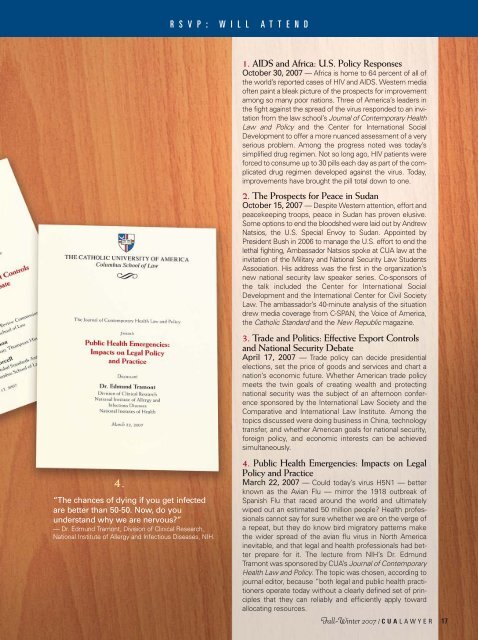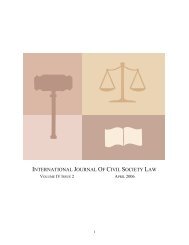CUA Cover Winter 2005 final (Page 2) - Columbus School of Law
CUA Cover Winter 2005 final (Page 2) - Columbus School of Law
CUA Cover Winter 2005 final (Page 2) - Columbus School of Law
- No tags were found...
Create successful ePaper yourself
Turn your PDF publications into a flip-book with our unique Google optimized e-Paper software.
R S V P : W I L L A T T E N D4.“The chances <strong>of</strong> dying if you get infectedare better than 50-50. Now, do youunderstand why we are nervous?”— Dr. Edmund Tramont, Division <strong>of</strong> Clinical Research,National Institute <strong>of</strong> Allergy and Infectious Diseases, NIH.1. AIDS and Africa: U.S. Policy ResponsesOctober 30, 2007 — Africa is home to 64 percent <strong>of</strong> all <strong>of</strong>the world’s reported cases <strong>of</strong> HIV and AIDS. Western media<strong>of</strong>ten paint a bleak picture <strong>of</strong> the prospects for improvementamong so many poor nations. Three <strong>of</strong> America’s leaders inthe fight against the spread <strong>of</strong> the virus responded to an invitationfrom the law school’s Journal <strong>of</strong> Contemporary Health<strong>Law</strong> and Policy and the Center for International SocialDevelopment to <strong>of</strong>fer a more nuanced assessment <strong>of</strong> a veryserious problem. Among the progress noted was today’ssimplified drug regimen. Not so long ago, HIV patients wereforced to consume up to 30 pills each day as part <strong>of</strong> the complicateddrug regimen developed against the virus. Today,improvements have brought the pill total down to one.2. The Prospects for Peace in SudanOctober 15, 2007 — Despite Western attention, effort andpeacekeeping troops, peace in Sudan has proven elusive.Some options to end the bloodshed were laid out by AndrewNatsios, the U.S. Special Envoy to Sudan. Appointed byPresident Bush in 2006 to manage the U.S. effort to end thelethal fighting, Ambassador Natsios spoke at <strong>CUA</strong> law at theinvitation <strong>of</strong> the Military and National Security <strong>Law</strong> StudentsAssociation. His address was the first in the organization’snew national security law speaker series. Co-sponsors <strong>of</strong>the talk included the Center for International SocialDevelopment and the International Center for Civil Society<strong>Law</strong>. The ambassador’s 40-minute analysis <strong>of</strong> the situationdrew media coverage from C-SPAN, the Voice <strong>of</strong> America,the Catholic Standard and the New Republic magazine.3. Trade and Politics: Effective Export Controlsand National Security DebateApril 17, 2007 — Trade policy can decide presidentialelections, set the price <strong>of</strong> goods and services and chart anation’s economic future. Whether American trade policymeets the twin goals <strong>of</strong> creating wealth and protectingnational security was the subject <strong>of</strong> an afternoon conferencesponsored by the International <strong>Law</strong> Society and theComparative and International <strong>Law</strong> Institute. Among thetopics discussed were doing business in China, technologytransfer, and whether American goals for national security,foreign policy, and economic interests can be achievedsimultaneously.4. Public Health Emergencies: Impacts on LegalPolicy and PracticeMarch 22, 2007 — Could today’s virus H5N1 — betterknown as the Avian Flu — mirror the 1918 outbreak <strong>of</strong>Spanish Flu that raced around the world and ultimatelywiped out an estimated 50 million people? Health pr<strong>of</strong>essionalscannot say for sure whether we are on the verge <strong>of</strong>a repeat, but they do know bird migratory patterns makethe wider spread <strong>of</strong> the avian flu virus in North Americainevitable, and that legal and health pr<strong>of</strong>essionals had betterprepare for it. The lecture from NIH’s Dr. EdmundTramont was sponsored by <strong>CUA</strong>’s Journal <strong>of</strong> ContemporaryHealth <strong>Law</strong> and Policy. The topic was chosen, according tojournal editor, because “both legal and public health practitionersoperate today without a clearly defined set <strong>of</strong> principlesthat they can reliably and efficiently apply towardallocating resources.Fall–<strong>Winter</strong> 2007 / <strong>CUA</strong>LAWYER17
















